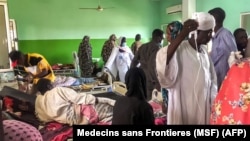The rights group charged that "several thousand" paramilitary, the Rapid Support Forces, fighters and allied Arab militias "summarily executed" at least 28 members of the Massalit ethnic minority when they ransacked and torched much of the town of Misterei in May.
Arriving at dawn "on motorcycles, horses or pickup trucks," the fighters launched an attack that resulted in the "near total burning of the town" of 46,000 residents, the watchdog said. Civilians were executed in schools and mosques where they had sought shelter, witnesses told HRW.
The group charged that the violations "amount to war crimes" and called on the ICC to investigate the attack on Misterei.
"We have been seeing the violence in West Darfur for quite some time since 2019. And I think it's really the time for the ICC, which already have an existing jurisdiction, to investigate Darfur with the referral of the Security Council. We urge them to look into the recent wave of violence in West Darfur in particular and investigate this crime," Mohamed Osman, a researcher in HRW's Africa division, told VOA.
An RSF spokesperson declined to provide a detailed response to the HRW report. RSF advisor Yousi Izzat told VOA they welcome an investigation by the ICC into the allegations, though they take issue with the rights organization accusing the paramilitary group before an investigation is carried out.
Efforts to broker an end to the violence between the RSF and Sudan's army have continued, and the East African regional bloc IGAD on Monday led a renewed push, calling on the warring parties to "sign an unconditional cease-fire."
The Sudanese army nonetheless boycotted the gathering in Addis Ababa, dampening hopes for an end to the nearly three-month-old conflict with the RSF.
The army accused Kenya, which headed the effort, of providing a haven to the Rapid Support Forces.
IGAD said it would request the African Union to look into possibly deploying the East Africa Standby Force — which is usually tasked with election observer missions — in Sudan "for the protection of civilians and ... humanitarian access."
Kenyan President William Ruto, who leads the IGAD quartet tasked with finding a solution to the Sudan conflict, reiterated calls for humanitarian passages.
On Tuesday Sudan's Foreign Ministry rejected IGAD's proposal to consider deploying peacekeeping forces to protect civilians.
"The disrespect of IGAD towards the opinions of its member states will cause the Sudanese government to re-think the utility of its membership in the organization," the foreign ministry said in a statement.
It did welcome an upcoming summit held by Egypt, widely-seen as closer to the army than to the RSF, to be held later this week.
Experts believe army leader Abdel Fattah al-Burhan and his former deputy, RSF commander Mohamed Hamdan Dagalo, have opted for a war of attrition and are hoping to extract more concessions at the negotiating table.
U.S. ambassador John Godfrey, who along with other diplomats was evacuated near the start of the conflict, warned that "a military 'victory' by either of the belligerents in the Sudan conflict would entail unacceptable human cost and damage to the country."
Godfrey called instead for "a negotiated exit from the crisis," which he said "does not — and cannot — mean returning to the status quo that existed before April 15."
Before the conflict erupted that day, the two generals had jointly ruled the country following an October putsch that derailed Sudan's fragile transition to civilian rule.
Godfrey further slammed "irresponsible" calls for continued fighting, pointing to the "horrific deaths by air strike of at least six people" in Khartoum North on Monday and of "at least 22 people on Friday in Omdurman."
U.S. Assistant Secretary of State for African Affairs Molly Phee was due to meet regional and Sudanese officials Tuesday in Addis Ababa.
The RSF paramilitaries have meanwhile been accused of a litany of abuses, including some that the United Nations said could amount to crimes against humanity.
The Hague is already investigating war crimes committed in Darfur during the conflict that erupted in 2003 and saw the Janjaweed — the precursor to the RSF — unleashed on ethnic minority rebels there in a conflict that killed over 300,000 people.
Around 3,000 people have been killed in the recent violence, according to the Armed Conflict Location and Event Data Project.
Information for this report came from AFP and Reuters. VOA's Nabeel Biajo contributed.

Forum